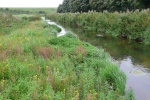James Wild MP - “Protecting North West Norfolk's coastline is vital”
Speaking in the last debate in the House of Commons before Christmas on coastal erosion, James Wild MP stressed the importance of protecting North West Norfolk’s coastline and coastal communities.
After meeting the Environment Agency and the Chairman of the East Wash Community Interest Company (EWCIC) on South Beach Heacham recently, James raised specific concerns regarding Snettisham and Heacham defences.
In particular, James raised his and constituents’ concerns about the beach recharge project which Environment Agency data found was not needed but which they said may not have been possible in any event due to technical and financial constraints. The recharge happens periodically in addition to an annual beach recycling organised by the EWCIC where sand and materials are moved to strengthen the sand and shingle ridge protecting properties and land. Forecast costs for the recharge project have increased from £3 million to £8 million.
James Wild MP said:
“Given the Environment Agency has £5.2 billion for flooding and coastal erosion projects it is not acceptable that the cost might prevent doing what is necessary for Snettisham and Heacham defences which are set out in the plans to defend the coast. The Environment Agency has assured me they are committed to long-term coastal defence measures.”
Further work is now under way to consider how to protect the coastline as well as the approach set out in the Wash East coast management strategy which identifies the most suitable way to manage flood and erosion risk.
James Wild MP also stressed the need to reform the existing funding threshold for coastal defences which does not give due importance to protected habits, farming land, or tourism. He said:
“The funding threshold for coastal defences does not give due importance to the damage to internationally renowned sites of special scientific interest, to habitats, agricultural land, or vital tourism. That approach clearly needs to be revised and reformed.”
Commenting after the debate, James Wild MP said:
“My constituents and I are in no doubt that protecting the coastline is vital. It should be a common cause that a managed retreat for loss of land is not acceptable in North West Norfolk. We need to hold the line.”
During the debate, James also raised the important commemoration of the 70th anniversary of the 1953 floods and the lessons from those terrible events that we must protect our coastlines and coastal communities to limit and mitigate coastal erosion.
Full text of speech on 19 December 2023:
"I, too, congratulate my hon. Friend the Member for Waveney (Peter Aldous) on securing this important debate and setting out so clearly the case for change. My North West Norfolk constituency has a glorious coastline stretching from the bottom of the Wash up to Hunstanton and its famous striped cliffs, across to Burnham Overy Staithe, before joining the constituency of my hon. Friend the Member for North Norfolk (Duncan Baker). However, along that coast we face significant coastal erosion and defence issues that need to be addressed.
This year, we marked 70 years since the terrible 1953 floods, with the tragic loss of many lives in Hunstanton, Snettisham and others parts of the east coast. Earlier this year, I was present at memorial events in Snettisham and other places to mark the anniversary. I came away from all of those with a clear sense that it is our duty as MPs and custodians of our areas to do all that we can to protect our coastline and coastal communities. By taking action we can help to limit and mitigate coastal erosion and its consequences, as set out in the shoreline management plans and the Wash East coastal management strategy.
Today I want to highlight the importance of coastal defences between Snettisham and Heacham, which are made up of a natural sand shingle ridge and stretches of concrete defences. Every year, there is a beach recycling where material is moved to top up the sand and the shingle ridge, which provides a natural flood defence for properties, caravan parks, holiday homes and prime agricultural land. That is an exemplar partnership project and I pay tribute to Mike McDonnell, chairman of the local community interest company that provides nearly 60% of the funding for the annual beach recharge. Only a few weeks ago, he stood on that shingle ridge with me as we met the Environment Agency and other organisations.
We were there to talk about local concern that the periodic beach recharge project, which was expected to take place and involves bringing new material on to the beach, is not happening this year. In part, that is due to an assessment by the Environment Agency of monitoring data that showed that it did not need to happen. However, that was concerning for my constituents and me. I met the Environment Agency because it said that financial and technical constraints meant that the measure was considered undeliverable in any case. The forecast costs had, for example, increased from £3 million to £8 million. However, given that the Environment Agency has £5.2 billion for flooding and coastal erosion projects, it is not acceptable that those costs might prevent doing what is necessary and what is set out in the plans to defend against coastal erosion.
The Environment Agency’s assessment means that further work is now under way to consider how to protect the coastline, as well as the approach set out in the Wash East coast management strategy.
My constituents, the county councillors, the borough councillors and I are in no doubt that protecting the coastline is vital. However, as King’s Lynn and West Norfolk local councillor group leaders highlighted in a recent letter to the Secretary of State, and as my hon. Friend the Member for Waveney has highlighted, the funding threshold for coastal defences does not give due importance to the damage to internationally renowned sites of special scientific interest, which I am lucky to have in my constituency, and to habitats, agricultural land or vital tourism. That approach clearly needs to be revised and reformed.
It should be a common cause that a managed retreat for loss of land is not acceptable in North West Norfolk. We need to hold the line. As I stood on the beach looking at the homes, the Environment Agency representatives assured me and others that they were committed to long-term coastal defence measures. In his letter last week responding to council leaders, my hon. Friend the Member for Waveney referred to the Environment Agency providing “assurances to the community that the management of this coastline is a high priority.”
So it must be. The Government must ensure that funding and support are in place for the shoreline management plan strategy for 2025 and onwards. We need to do everything we can to protect North West Norfolk’s coastal environment."


